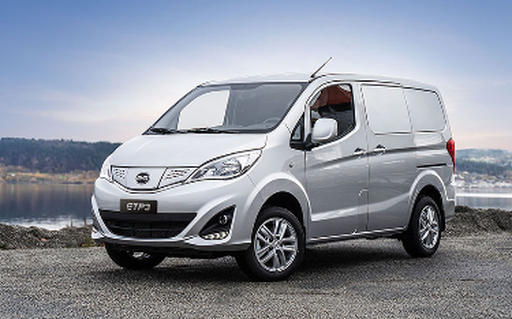BYD ETP3 vs VW Transporter Transporter - Differences and prices compared
Costs and Efficiency:
Looking at overall running costs, both models reveal some interesting differences in everyday economy.
BYD ETP3 has a somewhat advantage in terms of price – it starts at 31600 £, while the VW Transporter Transporter costs 37500 £. That’s a price difference of around 5895 £.
As for range, the VW Transporter Transporter performs distinct better – achieving up to 331 km, about 98 km more than the BYD ETP3.
Engine and Performance:
Power, torque and acceleration say a lot about how a car feels on the road. This is where you see which model delivers more driving dynamics.
When it comes to engine power, the VW Transporter Transporter has a clearly edge – offering 286 HP compared to 136 HP. That’s roughly 150 HP more horsepower.
In terms of top speed, the VW Transporter Transporter performs distinct better – reaching 150 km/h, while the BYD ETP3 tops out at 100 km/h. The difference is around 50 km/h.
There’s also a difference in torque: VW Transporter Transporter pulls clearly stronger with 415 Nm compared to 180 Nm. That’s about 235 Nm difference.
Space and Everyday Use:
Beyond pure performance, interior space and usability matter most in daily life. This is where you see which car is more practical and versatile.
Seats: VW Transporter Transporter offers decisively more seating capacity – 5 vs 2.
In curb weight, BYD ETP3 is somewhat lighter – 1640 kg compared to 1872 kg. The difference is around 232 kg.
When it comes to payload, VW Transporter Transporter clearly perceptible takes the win – 1259 kg compared to 780 kg. That’s a difference of about 479 kg.
Who wins the race?
The VW Transporter Transporter proves to be outperforms in nearly all aspects and therefore becomes our DriveDuel Champion!
VW Transporter Transporter is the better all-rounder in this comparison.

VW Transporter Transporter
Costs and Consumption
View detailed analysis
Engine and Performance
View detailed analysis
Dimensions and Body
View detailed analysis
BYD ETP3
The BYD ETP3 is a smart, no-nonsense electric offering that blends everyday practicality with a quietly modern design that won’t embarrass you in the supermarket car park. It’s ideal for buyers after fuss-free electric mobility — efficient, clever and just playful enough to make city driving a little more fun.
details @ BYD Auto / BYD Global Media
@ BYD Auto / BYD Global Media
VW Transporter Transporter
The VW Transporter is the workhorse of the modern tradesman, blending practical cleverness with a cabin that's actually pleasant to spend a long day in. It may not steal the style spotlight, but its unshowy durability, clever load solutions and easy-to-live-with character make it a sensible pick for businesses and weekend projects alike.
details
 @ BYD Auto / BYD Global Media
@ BYD Auto / BYD Global Media
|
|
|
|
|
Costs and Consumption |
|
|---|---|
|
Price
31600 £
|
Price
37500 - 60800 £
|
|
Consumption L/100km
-
|
Consumption L/100km
7.1 - 8.4 L
|
|
Consumption kWh/100km
-
|
Consumption kWh/100km
21.9 - 24.4 kWh
|
|
Electric Range
233 km
|
Electric Range
56 - 331 km
|
|
Battery Capacity
-
|
Battery Capacity
11.8 - 63.8 kWh
|
|
co2
0 g/km
|
co2
0 - 220 g/km
|
|
Fuel tank capacity
-
|
Fuel tank capacity
55 L
|
Dimensions and Body |
|
|---|---|
|
Body Type
Cargo Van
|
Body Type
Cargo Van
|
|
Seats
2
|
Seats
2 - 5
|
|
Doors
5
|
Doors
4 - 5
|
|
Curb weight
1640 kg
|
Curb weight
1872 - 2462 kg
|
|
Trunk capacity
-
|
Trunk capacity
-
|
|
Length
4460 mm
|
Length
5050 - 5450 mm
|
|
Width
1720 mm
|
Width
2032 mm
|
|
Height
1875 mm
|
Height
1966 - 1985 mm
|
|
Max trunk capacity
3500 L
|
Max trunk capacity
-
|
|
Payload
780 kg
|
Payload
755 - 1259 kg
|
Engine and Performance |
|
|---|---|
|
Engine Type
Electric
|
Engine Type
Diesel, Plugin Hybrid, Electric
|
|
Transmission
Automatic
|
Transmission
Manuel, Automatic
|
|
Transmission Detail
-
|
Transmission Detail
Manual Gearbox, Automatic Gearbox
|
|
Drive Type
Rear-Wheel Drive
|
Drive Type
Front-Wheel Drive, All-Wheel Drive, Rear-Wheel Drive
|
|
Power HP
136 HP
|
Power HP
110 - 286 HP
|
|
Acceleration 0-100km/h
-
|
Acceleration 0-100km/h
7.4 - 16.9 s
|
|
Max Speed
100 km/h
|
Max Speed
112 - 150 km/h
|
|
Torque
180 Nm
|
Torque
310 - 415 Nm
|
|
Number of Cylinders
-
|
Number of Cylinders
4
|
|
Power kW
100 kW
|
Power kW
81 - 210 kW
|
|
Engine capacity
-
|
Engine capacity
1996 - 2488 cm3
|
General |
|
|---|---|
|
Model Year
2023
|
Model Year
2025
|
|
CO2 Efficiency Class
A
|
CO2 Efficiency Class
G, A
|
|
Brand
BYD
|
Brand
VW
|
What drive types are available for the BYD ETP3?
The BYD ETP3 is offered with Rear-Wheel Drive.
The prices and data displayed are estimates based on German list prices and may vary by country. This information is not legally binding.
